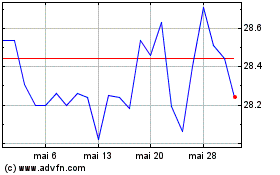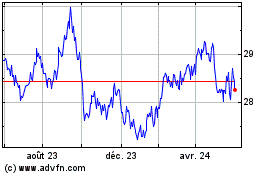An actively-managed ETF that has the potential to profit from
both rising and falling commodity price trends
First Trust Advisors L.P. (“First Trust”), a leading ETF
provider, has launched a new exchange-traded fund (“ETF”), the
First Trust Alternative Absolute Return Strategy ETF (Nasdaq:
FAAR). The fund is actively managed and seeks to provide investors
with long-term total return by investing primarily in
exchange-listed commodity futures contracts through a wholly-owned
subsidiary of the fund.
The fund’s investment process involves taking long and short
positions in commodity futures contracts through its subsidiary.
Historically, returns within the different commodity markets have
varied greatly allowing for many opportunities to employ the
long/short strategy. Futures contracts are contractual agreements
to buy or sell a particular commodity or financial instrument at a
predetermined price and date in the future. Taking a “long”
position means purchasing a futures contract. The owner of a “long”
position in a futures contract may profit from an increase in the
price of the underlying commodity, and conversely, will incur a
loss if the underlying commodity declines in price. Taking a
“short” position means selling a futures contract. The owner of a
“short” position in a futures contract may profit from a decrease
in the price of the underlying commodity, and conversely, will
incur a loss if the underlying commodity increases in price. The
ability to take long and short positions provides the potential to
generate positive returns over time in both rising and falling
markets.
“Absolute return offers the potential to provide long-term total
return in a variety of market environments. Additionally, the
strategy may offer low or no correlation to equities, bonds, real
estate and long-only commodities,” said John Gambla, CFA, FRM, PRM
and Senior Portfolio Manager for the Alternatives Investment Team
at First Trust. Combining uncorrelated asset classes in an overall
portfolio—that is, those that have performed differently over
varying market conditions—increases diversification. “Global
capital markets are increasingly integrated, correlations are
rising among the major asset classes, and volatility is reverting
back to long-term norms. In such an environment, absolute return
strategies with lower correlation profiles can provide the robust
diversification that is a cornerstone of modern portfolio theory,”
Gambla said. Although diversification does not guarantee a profit
or protect against a loss, including an investment strategy that is
not available in traditional investment portfolios, may help to
generate more consistent returns and may potentially smooth out
volatility.
Typically, ETFs that invest in commodity futures contracts
generate a form K-1 for tax reporting, which may create
complications for investors at tax time. The fund, on the other
hand, does not issue K-1s for tax purposes. Instead investors will
receive a Form 1099 with distributions reported as ordinary income,
avoiding the potential complications of K-1 reporting.
Along with John Gambla, Rob Guttschow, CFA, will also
serve as Senior Portfolio Manager of the fund. The two will
primarily be responsible for daily investment decisions under the
direction of an Investment Committee which includes four other
individuals with extensive investment experience.
For more information about First Trust, please contact Ryan
Issakainen of First Trust at (630) 765-8689 or
RIssakainen@FTAdvisors.com.
About First Trust
First Trust Advisors L.P., along with its affiliate First Trust
Portfolios L.P., are privately held companies which provide a
variety of investment services, including asset management and
financial advisory services, with collective assets under
management or supervision of approximately $97.03 billion as of
April 29, 2016 through unit investment trusts, exchange-traded
funds, closed-end funds, mutual funds and separate managed
accounts. First Trust is based in Wheaton, Illinois. For more
information, visit http://www.ftportfolios.com.
You should consider the fund’s investment objectives, risks,
and charges and expenses carefully before investing. Contact First
Trust Portfolios L.P. at 1-800-621-1675 to obtain a prospectus or
summary prospectus which contains this and other information about
the fund. The prospectus or summary prospectus should be read
carefully before investing.
ETF Characteristics
The fund lists and principally trades its shares on The Nasdaq
Stock Market LLC.
Investors buying or selling fund shares on the secondary market
may incur customary brokerage commissions. Market prices may differ
to some degree from the net asset value of the shares. Investors
who sell fund shares may receive less than the share's net asset
value. Shares may be sold throughout the day on the exchange
through any brokerage account. However, unlike mutual funds, shares
may only be redeemed directly from the fund by authorized
participants, in very large creation/redemption units.
Risks
The fund's shares will change in value, and you could lose money
by investing in the fund. One of the principal risks of investing
in the fund is market risk. Market risk is the risk that a
particular security owned by the fund or shares of the fund in
general, may fall in value.
The trading prices of commodities futures, fixed income
securities and other instruments fluctuate in response to a variety
of factors. The fund's net asset value and market price may
fluctuate significantly in response to these factors. As a result,
an investor could lose money over short or long periods of time. In
addition, the net asset value of the fund may be more volatile over
short-term periods than other investment options because of the
fund's significant use of financial instruments that have a
leveraging effect.
The fund is subject to management risk because it is an actively
managed portfolio. In managing the fund’s investment portfolio, the
advisor will apply investment techniques and risk analyses that may
not have the desired result. There can be no guarantee that the
fund will meet its investment objective.
The fund does not invest directly in futures instruments.
Rather, it invests in a wholly owned subsidiary, which will have
the same investment objective as the fund, but unlike the fund, it
may invest without limitation in futures instruments. The
subsidiary is not registered under the 1940 Act and is not subject
to all the investor protections of the 1940 Act. Thus, the fund, as
an investor in the subsidiary, will not have all the protections
offered to investors in registered investment companies.
The failure or bankruptcy of the fund's and the subsidiary's
clearing broker could result in a substantial loss of fund
assets.
The value of commodities and commodity-linked instruments
typically is based upon the price movements of a physical commodity
or an economic variable linked to such price movements. The prices
of commodities and commodities-linked instruments may fluctuate
quickly and dramatically and may not correlate to price movements
in other asset classes. An active trading market may not exist for
certain commodities. Each of these factors and events could have a
significant negative impact on the fund.
All futures and futures-related products are highly volatile.
Price movements are influenced by a variety of factors, including:
changes in overall economic conditions, changes in interest rates,
or factors affecting a particular commodity or industry, such as
production, supply, demand, drought, floods, weather, political,
economic and regulatory developments. Futures contracts may be less
liquid than other types of investments.
The fund regularly purchases and sells commodity futures
contracts to maintain a fully invested position. This frequent
trading may increase the amount of commissions or mark-ups to
broker-dealers that the fund pays when it buys and sells contracts,
which may detract from the fund's performance.
The fund currently intends to effect most creations and
redemptions, in whole or in part for cash, rather than in-kind
securities. As a result, the fund may be less tax-efficient.
The fund, through the subsidiary, will engage in trading on
commodity markets outside the U.S. Trading on such markets is not
regulated by any U.S. government agency and may involve certain
risks not applicable to trading on U.S. exchanges. The subsidiary
is subject to portfolio turnover risk, which may result in the fund
paying higher levels of transaction costs and generating greater
tax liability for shareholders, with the potential to lessen
performance. The fund holds investments that are denominated in
non-U.S. currencies, or in securities that provide exposure to such
currencies, currency exchange rates or interest rates denominated
in such currencies. Changes in currency exchange rates and the
relative value of non-U.S. currencies may affect the value of the
fund's investments and the value of the fund's shares. Commodity
futures contracts traded on non-U.S. exchanges or with non-U.S.
counterparties present risks because they may not be subject to the
same degree of regulation as their U.S. counterparts. The fund
intends to treat any income it may derive from commodity futures
contracts received by the subsidiary as qualified income, subject
to regulatory rules and annual re-examination.
The fund may be subject to the forces of "whipsaw" markets (as
opposed to choppy or stable markets), in which significant price
movements develop but then repeatedly reverse, which could cause
substantial losses.
The fund is classified as "non-diversified" and may invest a
relatively high percentage of its assets in a limited number of
issuers. As a result, the fund may be more susceptible to a single
adverse economic or regulatory occurrence affecting one or more of
these issuers, experience increased volatility and be highly
concentrated in certain issuers.
Alternative investments may employ complex strategies, have
unique investment and risk characteristics and may not be suitable
for all investors.
Shorting may result in greater gains or greater losses. Short
selling creates special risks which could result in increased
volatility of returns. Because losses on short sales arise from
increases in the value of the security sold short, such losses are
theoretically unlimited.
Certain securities in the fund are subject to credit risk,
interest rate risk, and income risk. Credit risk is the risk that
an issuer of a security will be unable or unwilling to make
dividend, interest and/or principal payments when due and that the
value of a security may decline as a result. Interest rate risk is
the risk that the value of the fixed income securities in the fund
will decline because of rising market interest rates. Income risk
is the risk that income from the fund’s fixed income investments
could decline during periods of falling interest rates.
The fund currently has fewer assets than larger funds, and like
other relatively new funds, large inflows and outflows may impact
the fund's market exposure for limited periods of time.
The fund is subject to gap risk, which is the risk that a
commodity price will change from one level to another with no
trading in between.
The fund is subject to regulatory risk, which may result in
commodity contract positions requiring liquidation at
disadvantageous times or prices.
The fund’s investment in repurchase agreements may be subject to
market and credit risk with respect to the collateral securing the
repurchase agreements.
The fund may invest in U.S. government obligations, including
U.S. Treasury obligations and securities. Securities issued or
guaranteed by federal agencies and U.S. government sponsored
instrumentalities may or may not be backed by the full faith and
credit of the U.S. government.
First Trust Advisors L.P. is the adviser to the fund. First
Trust Advisors L.P. is an affiliate of First Trust Portfolios L.P.,
the fund's distributor.
First Trust Advisors L.P. is registered as a commodity pool
operator and commodity trading advisor and is also a member of the
National Futures Association.
View source
version on businesswire.com: http://www.businesswire.com/news/home/20160519005822/en/
First TrustRyan
Issakainen630-765-8689RIssakainen@FTAdvisors.com
First Trust Alternative ... (NASDAQ:FAAR)
Graphique Historique de l'Action
De Jan 2025 à Fév 2025

First Trust Alternative ... (NASDAQ:FAAR)
Graphique Historique de l'Action
De Fév 2024 à Fév 2025


